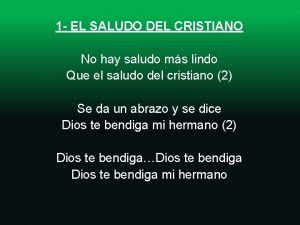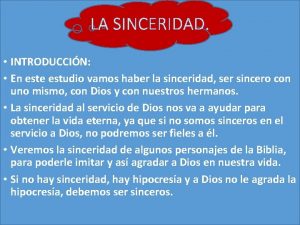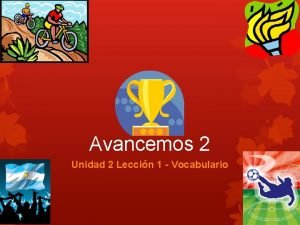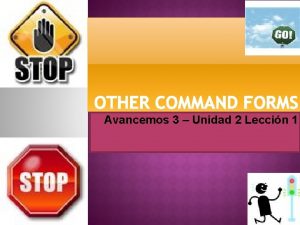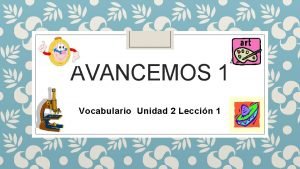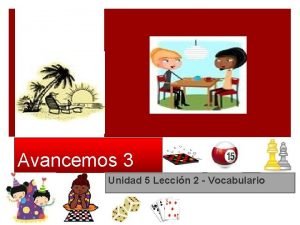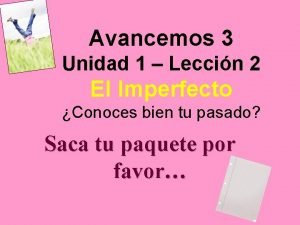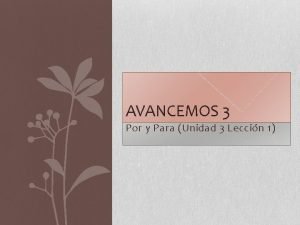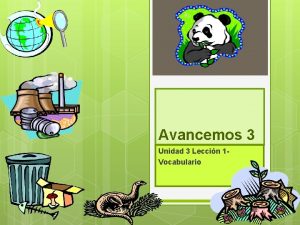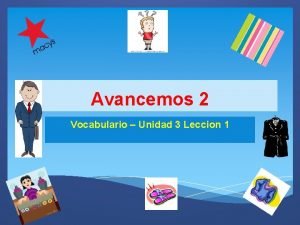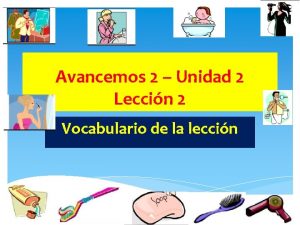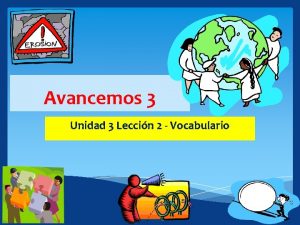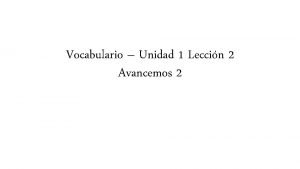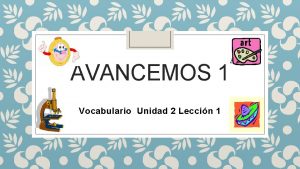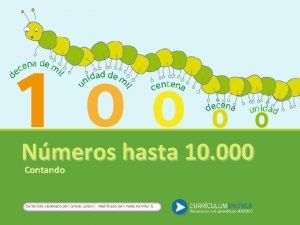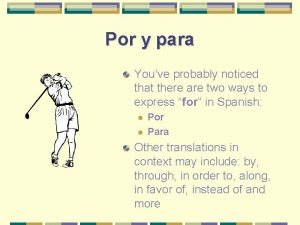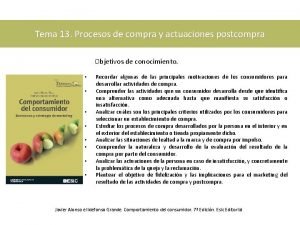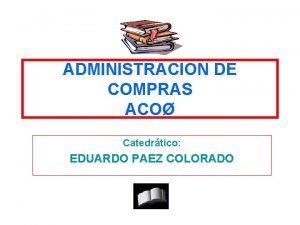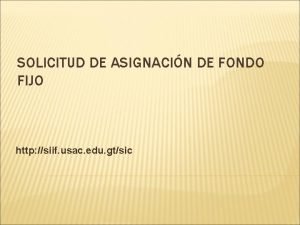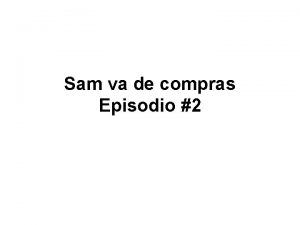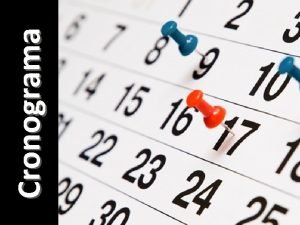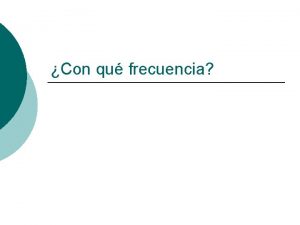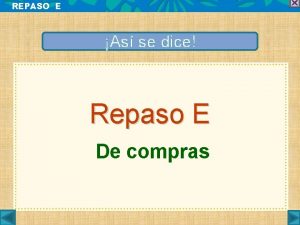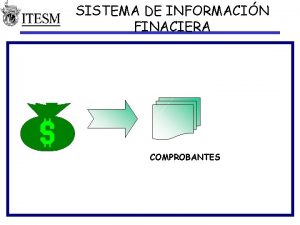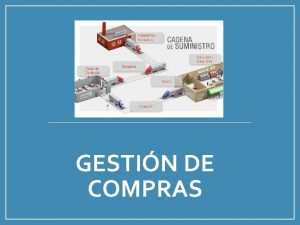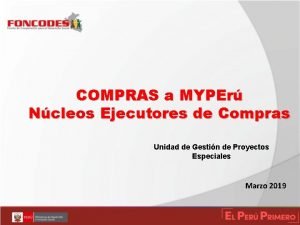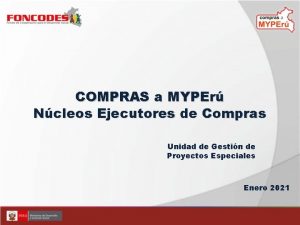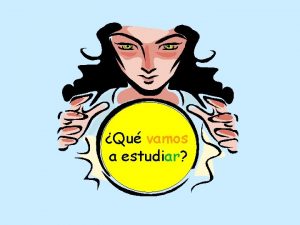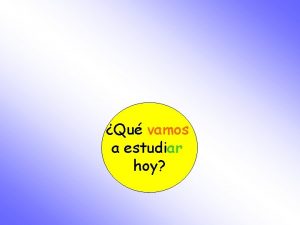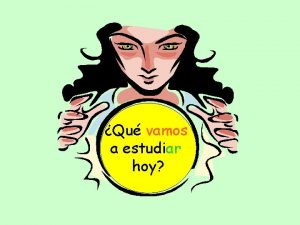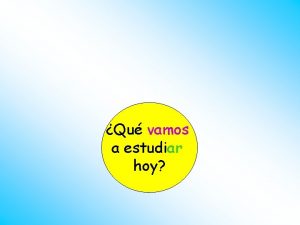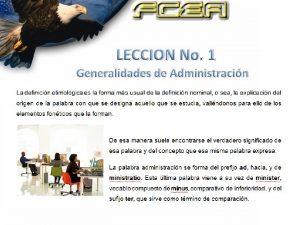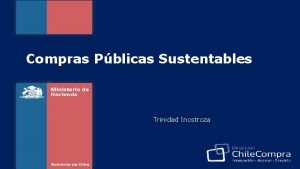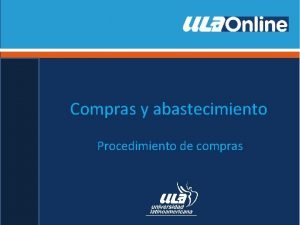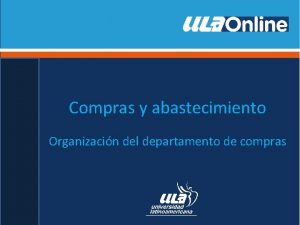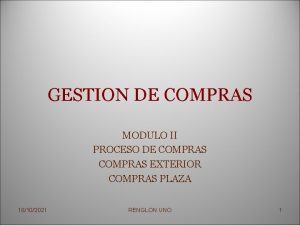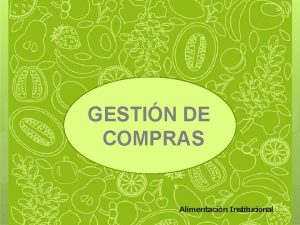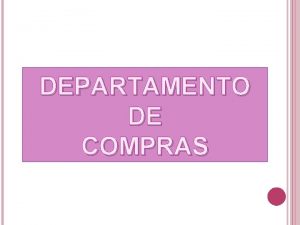UNIDAD 4 Leccion 1 Vamos de Compras Leccion




























- Slides: 28

UNIDAD 4 Leccion 1 – ¡Vamos de Compras! Leccion 2 - ¿Qué hacemos esta noche?

Leccion 1 - ¡Vamos de Compras! • In this lesson you will learn to • Talk about what clothes you want to buy • Say what you wear in different season • Using • Tener expressions • Stem-changing verbs: e – ie • Direct object pronouns • ¿Recuerdas? • Numbers 11 to 100 • The verb tener • After-school activities

Warm up 1. Alicia is as tall as her sister 2. My cousin is less athletic than I. 3. Yorgurt is as delicious as icecream. 4. Patricia is funnier than her brother. 5. Jorge plays the guitar better than his father.

Vocabulario Talk About Shopping • el centro comercial - shopping center, mall • ¿Cuánto cuesta(n)? - How much does it (do they) cost? • Cuesta(n). . . - It costs. . . (They cost. . . ) • el dinero - money • el dólar - dollar • el euro - euro • ir de compras - to go shopping • pagar - to pay • el precio - price • la tienda - store Expressions with tener • tener calor - to be hot • tener frío - to be cold • tener razón - to be right • tener suerte - to be lucky

Vocabulario Describe Clothing • la blusa - blouse • los calcetines - socks • la camisa - shirt • la camiseta - T-shirt • la chaqueta - jacket • feo(a) - ugly • el gorro - winter hat • los jeans - jeans • llevar - to wear • nuevo(a) - new • los pantalones - pants • los pantalones cortos - shorts • la ropa - clothing • el sombrero - hat • el vestido - dress • los zapatos - shoes • •

Vocabulario Colors • amarillo(a) - yellow • anaranjado(a) - orange • azul - blue • blanco(a) - white • marrón (pl. marrones) - brown • negro(a) - black • rojo(a) - red • verde - green

Vocabulario Discuss Seasons • la estación (pl. las estaciones) season • el invierno winter • el otoño autumn, fall • la primavera spring • el verano summer Other Words and Phrases • durante during • cerrar (ie) to close • empezar (ie) to begin • entender (ie) to understand • pensar (ie) to think, to plan • preferir (ie) to prefer • querer (ie) to want


Practicar el Vocabulario • Using the catalogues, find describe articles of clothing (color, cost, etc. ) and ask your partner to identify it in the magazine. • Make a chart with the names of the 4 seasons. Write what article of clothing you would wear in each season. • Pg. 196 #1, 2, 4 • Telehistoria - #3

Gramatica Tener expressions • Can you list “tener” expressions we’ve learned so far? • Tener hambre • Tener sed • Tener ganas de • Tener años • Here a few more “tener” expressions • Tener calor • Tener frío • Tener razón • Tener suerte • Tener sueño • Tener miedo • Tener cuidado


Practicar 1. I am hungry ______________ 2. We feel like running ______________ 3. You are lucky ______________ 4. Are they scared? ______________ 5. They are careful ______________ 6. He is sleepy ______________ 7. I am always right ______________ 8. We are cold ______________ 9. She is 14 years old ______________

Warm Up 1. During the winter, I wear pants. 2. My sister is always careful. 3. The yellow shirts cost fifty euros. 4. My jacket is old; I have to buy a new jacket. 5. It is cold, and I am cold

Actividad • Con un compañero, usar los catálogos de ropa y escribir un sketch. • Ask how much an item costs, what item you want to buy, specify size and color, tell the item number.

Gramatica • Stem-Changing Verbs: e – ie • In Spanish, some verbs have a stem change in the present tense • How do you form the present tense of e – ie stem? Entender – to understand • Here’s how: • Stem-changing verbs have regular –er and –ir present-tense endings • For e – ie stem-changing verbs, the e of the stem changes to ie in all forms except the nosotros(as) and vosotros(as). Example: querer → quiero

Querer – to want quiero quieres quiere queremos queréis quieren Other stem-changing verbs you have learned are • • cerrar empezar entender pensar preferir acertar recommendar In stem-changing verbs, it is the next-to-last syllable that changes.

Warm Up • • • • Hablar Llevar Cerrar Comer Estar Pensar Beber Querer Vivir Empezar Leer Preferir Compartir Entender

Ejemplos: Paula prefers the blue dress Paula prefiere el vestido azul – preferir Do you want to watch TV or read a book? ¿Quieres mirar la televisión or leer un libro? - querer Do you all understand the information? ¿Ustedes entienden la información? – entender We begin everyday with sentences. Nosotros empezemos todos los días con los oraciones empezar

Practicar 1. She thinks _________ 2. We guess _________ 3. They recommend _________ 4. He begins _________ 5. We understand _________ 6. You all close _________ 7. I prefer _________

Practicar • Pg. 200 #6, 7, 8 • Telehistoria 2 • Pg. 203 #9 Para y Piensa 1. Yo ______ que la blusa amarilla es bonita. 2. Ya hace frio cuando ______ el invierno 3. El centro comerical ______ a las nueve de la noche. empezar cerrar pensar

Direct Object Pronouns • What is a direct object pronoun (DOP)? • It is a person or thing receiving the action of the verb. • I bought you a shirt. • She gave Marco a ride home. • We share pizza for lunch. • We ate dinner at 6: 00. • DOP’s can also be used to avoid repeating nouns that have already been mentioned. • I bought you a shirt. Do you like it? • We share pizza for lunch. It is delicious. • We ate dinner at 6: 00. We ate it in the dining room.

Direct Object Pronouns • DOP’s in Spanish and English Singular Masculine Feminine Plural Me me Nos us Te you (informal) Os you (informal) Lo you (formal), him, it Los you, them La you (formal), her, it Las you, them • The direct object noun is placed after the conjugated verb. • The direct object pronoun is place before the conjugated verb Quiero la camisa azul I want the blue shirt La quiero I want it.

Direct Object Pronouns When an infinitive follows the conjugated verb, the DOP can be placed before the conjugated verb or be attached to the infinitive. Quiero comprar zapatos negros. or I want to buy black shoes. Y los quiero comprar hoy Y quiero comprarlos hoy. And I want to buy them today

Warm Up 1. I want to buy the blue dress. 2. We wear pants in the winter. 3. The mall closes at 9: 00 at night. 4. Is spring going to begin soon? 5. How much do the t-shirt and socks cost?

Direct Object Pronouns When an infinitive follows the conjugated verb, the DOP can be placed before the conjugated verb or be attached to the infinitive. Quiero comprar zapatos negros. or I want to buy black shoes. Y los quiero comprar hoy Y quiero comprarlos hoy. And I want to buy them today

Practicar • Text p. 205 # 11, 12 • Telehistoria 2 p. 202 • #9 • With a partner, read through the dialogue on p. 202 ad replace direct object nouns with DOPs. Enrique: Sí, entiendo. Dos munutos más. ¿Prefieres los vaqueros negros o los pantalones verdes? Enrique: Sí, entiendo. Dos munutos más. ¿Los prefieres o los prefieres? • WB – p. 154 -155

Warm Up • I want to buy some new shoes. I want to buy them. • You prefer the red dress. You prefer it. • We have to wear pants, shorts, or skirts to school. We have to wear them to school. • The store closes at 6: 00 at night. It closes at 6: 00 at night.

Todo junto • Telehistoria completa • Lee el dialogo. • Encuentra las oraciones con los DOPs • Escribe el DOP y el DON • P. 208 #15, 16 • WB p. 162 -164
 Cuan grande es el con letra
Cuan grande es el con letra Un ejemplo de sinceridad
Un ejemplo de sinceridad Avancemos 2 unidad 2 leccion 1
Avancemos 2 unidad 2 leccion 1 Avancemos 3 unidad 2 leccion 1
Avancemos 3 unidad 2 leccion 1 Avancemos 1 unidad 2 leccion 1
Avancemos 1 unidad 2 leccion 1 Avancemos 3 unidad 5 leccion 2
Avancemos 3 unidad 5 leccion 2 Lo conoces avancemos 3
Lo conoces avancemos 3 Avancemos 3 unidad 3 leccion 1
Avancemos 3 unidad 3 leccion 1 Avancemos 3 unidad 1 leccion 1
Avancemos 3 unidad 1 leccion 1 Avancemos 3 unidad 3 leccion 1
Avancemos 3 unidad 3 leccion 1 Unidad 3 leccion 2
Unidad 3 leccion 2 Avancemos 2 unidad 2 leccion 2
Avancemos 2 unidad 2 leccion 2 Avancemos 3 unidad 3 leccion 2
Avancemos 3 unidad 3 leccion 2 Avancemos 2 unidad 1 leccion 2
Avancemos 2 unidad 1 leccion 2 Unidad 2 leccion 1
Unidad 2 leccion 1 Unidad decena centena unidad de millar
Unidad decena centena unidad de millar Republic act no 55 agrarian reform
Republic act no 55 agrarian reform Presupuesto de materias primas
Presupuesto de materias primas Este pastel es ___ mi madre.
Este pastel es ___ mi madre. Juego de inventarios
Juego de inventarios Cadena de valor publico
Cadena de valor publico Las compras
Las compras El plan valorizado de compras se convierte en
El plan valorizado de compras se convierte en Siif usac
Siif usac Sam va de compras worksheet answers
Sam va de compras worksheet answers Horizontal
Horizontal Yo voy el lunes
Yo voy el lunes Answer key
Answer key Encabezado del balance general
Encabezado del balance general
